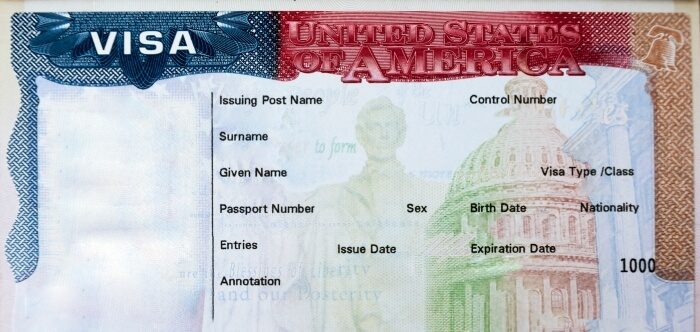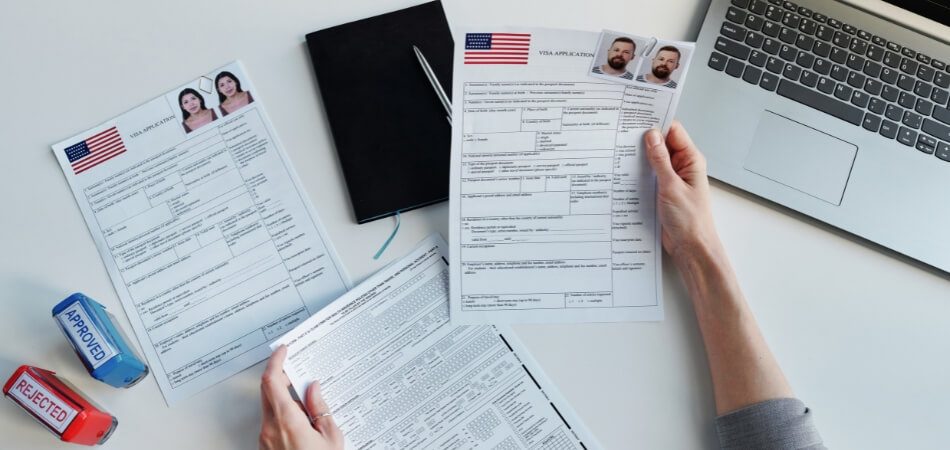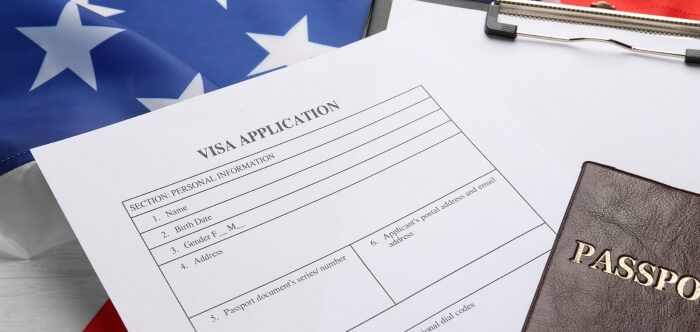Are you curious about the requirements for obtaining a visa to attend a conference in the United States? Many prospective participants wonder, “Do I need visa to attend conference in USA?” due to the complexity of international travel.
It depends. Visa requirements may vary based on the conference’s nature and your country of residence. See the U.S. embassy or consulate in your area to guarantee a trouble-free travel experience and steer clear of any unforeseen issues.
By understanding and reviewing your specific circumstances, you can determine the exact visa requirements, ensuring a hassle-free trip and productive conference experience. Go deeper into this post to get a comprehensive guide that will simplify the process of getting ready for your trip.
What is the Purpose of a Visa?
A visa serves as an authorization granted by a country, permitting a foreigner to enter, stay, or leave its territories. This official document is often stamped or affixed to the traveler’s passport, serving as an essential entry ticket. Its primary purpose is to regulate and monitor visitors to ensure national security and control immigration.
Visas serve as a means for countries to regulate the flow of tourists, workers, students, and other visitor categories. Through the classification of visas into various types such as tourist, business, student, and more, nations can tailor the duration, intent, and terms of the stay.
This categorization guarantees that individuals are present in the country for valid purposes, under their visa category. For instance, overseas attendees need a visa to attend conference in the USA and they must undergo the same procedural requirements.
Beyond immigration control, visas provide a mechanism for governments to promote diplomatic and economic relations. By granting or denying visas, countries can encourage trade, tourism, and cultural exchange, promoting international cooperation.
Conversely, they can use visa policies to exert political influence, protect national interests, and respond to changing global circumstances. The issuance or refusal of visas can become a powerful tool in shaping a country’s foreign relations.
Do I Need Visa to Attend Conference in USA?
Leaving for a conference in the United States? “Do I Need Visa to Attend Conference in USA?” is a commonly asked question by attendees. To ensure a seamless conference experience, let’s address this urgent issue.
Traveling to the U.S. mandates certain entry requirements based on your nationality and visit’s purpose. While some countries benefit from the Visa Waiver Program, others don’t. Hence, most attendees require an appropriate visa, typically the B-1 Business Visa, for conferences or professional events.
However, it’s essential to note that visa requirements can vary based on the conference’s nature and your circumstances. For instance, combining tourism with the event might necessitate a B-2 Tourist Visa. It’s essential to understand the specifics before applying, ensuring you select the right visa for your needs.
To avoid unforeseen challenges and navigate the intricacies of U.S. visa requirements, always consult the U.S. embassy or consulate in your region. They provide accurate guidelines tailored to your unique situation, ensuring you have the right visa in hand and making the conference experience memorable.
Different Types of Visas for Conference Attendees
Attending conferences abroad often requires the right visa type. Different visas cater to various purposes, so understanding your options is crucial to ensure successful and hassle-free participation in international events. If you are planning to attend a conference in USA with invitation letter from reputed organizers you must have a good understanding of the types of visas available for conference attendees. Here’s a breakdown of the types of visas typically relevant to conference attendees:
Business (B-1) Visa
This visa is typically used for business-related activities, excluding gainful employment. Attendees at conferences, seminars, or professional events often require this. Short-duration training sessions might also fall under this category. It’s a commonly sought-after visa for professional purposes.
Tourist (B-2) Visa
While primarily for tourism, some conference attendees might use this visa. It suits those combining leisure travel with short-term non-business events. However, its validity depends on the specific event’s nature and hosting organization. Ensure it aligns with your conference’s purpose.
Exchange Visitor (J-1) Visa
Ideal for those participating in exchange programs, this visa suits attendees of educational or cultural events. It’s tailored for scholars, interns, or trainees visiting for specific programs. Participants engage in cultural exchange and share their experiences back home.
Temporary Worker (H-1B) Visa
This visa is designed for professionals in specialty occupations attending work-related conferences. It requires an employer-petitioner to initiate the application. The event should align with the individual’s specialty occupation and professional development.
Student (F-1) Visa
You may qualify for this visa if you are attending a conference as a student, a seminar, or a workshop related to academics. The event must correlate with their field of study. Attending events as a part of coursework or research might necessitate this visa type.
Diplomatic (A-1/A-2) Visa
Reserved for government officials and diplomats, this visa is for those attending intergovernmental conferences or events. It ensures smooth entry and stays for official purposes. The host country often provides guidelines for application and stay.
By identifying the visa category best suited to your conference’s nature and purpose, you can facilitate a straightforward application process and ensure compliance with immigration rules.
How to Determine Your Visa Requirement?
Ensuring a smooth conference trip to the U.S. begins with understanding your visa requirements. Visa types and regulations are complex and should be navigated carefully. Here’s a comprehensive step guide to help you determine your visa requirement, ensuring a trouble-free journey to your conference destination.
Step 1: Identify Your Nationality
First, consider your nationality. Different countries have different visa requirements for entry into the U.S. Check if your home country is eligible for the Visa Waiver Program (VWP) or if you’ll need a visa.
Step 2: Assess Conference Details
Examine the specifics of the conference you plan to attend. Understand its duration, purpose, and any invitations or documentation provided by the organizers. This will help you establish the nature of your visit.
Step 3: Determine Visa Type
Based on your conference’s nature, determine the most suitable visa type. If it’s primarily for professional purposes, a B-1 Business Visa might be appropriate. If you plan to combine tourism, a B-2 Tourist Visa might be necessary.
Step 4: Combine Visa Types
Sometimes, your trip might include both conference attendance and other activities like tourism. In such cases, you might need two different visa types. For instance, a B-1 Business Visa for the conference and a B-2 Tourist Visa for sightseeing. Make sure your visa choices match your plans.
Step 5: Check Visa Waiver Program Eligibility
If your country is in the Visa Waiver Program, it means you might not need a visa for short U.S. visits. But you should check if your trip meets the VWP requirements. This can save you the hassle of applying for a visa for your conference and related travel activities.
Step 6: Research U.S. Embassy Guidelines
Consult the U.S. embassy or consulate in your region for specific guidelines tailored to your situation. They can provide accurate information on visa requirements and the application process.
Step 7: Prepare Your Application
Once you’ve determined your USA visa requirement for the conference, gather the necessary documents and prepare your visa application accordingly. Pay close attention to details to avoid any delays or issues during the application process.
These steps help you figure out if you need a visa for your U.S. conference trip. Keep in mind that visa rules can change, so plan and consult the U.S. embassy for the latest info. This ensures a smooth conference experience. Safe travels!
Tips for a Successful Visa Application
A successful visa application is a critical step toward attending a conference in a foreign country. An attendee must know the visa requirements and application process before stepping forward to the visa application system. Once you gain a good command over the visa processing system, it’s time to get a conference visa for USA and roll on to join your dream event. Whether you’re planning to participate in a professional event, academic conference, or any other international gathering, these tips will help you navigate the application process effectively and increase your chances of obtaining the necessary visa for your trip.
- Start Early: Initiate your visa application well in advance to accommodate processing times and potential delays. Early preparation reduces stress.
- Complete Forms Accurately: Fill out visa application forms meticulously, ensuring all information matches your documents. Consistency is crucial.
- Gather Required Documents: Collect all necessary documents, including passport, photo, and invitation letters, following the embassy’s checklist. Organize them neatly.
- Pay Fees Promptly: Pay visa application fees promptly and retain payment receipts as proof. Keep your financial records in order.
- Dress Appropriately: Dress professionally when attending visa interviews to make a positive impression. It shows respect for the process.
- Interview Preparation: Practice answering interview questions honestly and concisely, highlighting your conference’s purpose. Confidence and clarity matter.
- Be Honest: Always provide truthful information on your application and during interviews to avoid complications. Honesty builds trust.
- Travel Itinerary: Present a clear travel itinerary, including conference dates, accommodation, and return flight details. Clarity ensures understanding.
- Financial Documentation: Show proof of sufficient funds to cover your stay and expenses during the conference. Transparency is key.
- Follow-up: Monitor your application status and respond promptly to any embassy requests for additional information or documents. Proactive communication is crucial.
By following these tips and thoroughly preparing your visa application, you increase your chances of a successful outcome and a smooth journey to your conference destination.
Frequently Asked Questions
Here are some USA conference visa-related questions that people often inquire about. We have provided adequate answers to these questions to guide you on the right track.
Do I Need a Visa to Attend a Conference in the USA?
Ans. Yes, most international travelers need a visa to attend a conference in the USA. The typical visa for this purpose is a B-1 visa (Business Visitor Visa). However, citizens of countries under the Visa Waiver Program (VWP) may enter the U.S. without a visa but must apply for ESTA (Electronic System for Travel Authorization).
What Type of Visa is Required to Attend a Conference in the USA?
Ans. The B-1 visa is generally required for attending conferences, meetings, or seminars in the USA. If you qualify for the Visa Waiver Program, you can attend a conference using an ESTA.
What Documents Are Needed to Apply for a B-1 Visa for a Conference?
Ans. Commonly required documents include a valid passport, a completed DS-160 form, proof of conference registration or invitation, evidence of funds to cover expenses, and a plan to return to your home country after the conference.
Can I Work or Present at the Conference With a B-1 Visa?
Ans. You can participate in the conference, including presenting, as long as you are not receiving payment from a U.S. source. B-1 visas are strictly for business and not for employment or paid activities.
Can I Extend My Stay in the US After Attending the Conference on a B-1 Visa?
Ans. Extension of stay on a B-1 visa is possible but not guaranteed. You must apply for an extension with the USCIS and provide a valid reason for the extended stay that aligns with your visa’s purpose.
Bottom Line
Organizing a conference in the United States naturally raises the question: Do I need visa to attend conference in USA? The answer isn’t always straightforward and varies based on your background and the specifics of the event. Properly identifying your visa type, whether it’s Business, Tourist, or another category, is a must to avoid any hitches.
Consultation with the U.S. embassy can provide clear guidelines, making the process less daunting. Remember, every traveler’s situation is unique, so understanding the specifics tailored to you is pivotal. Getting a grasp on these requirements early can significantly ease your preparations.
So, as you gear up for your conference adventure, place understanding visa needs high on your checklist. A little planning and research ensure a smooth, enriching, and hassle-free conference journey.








